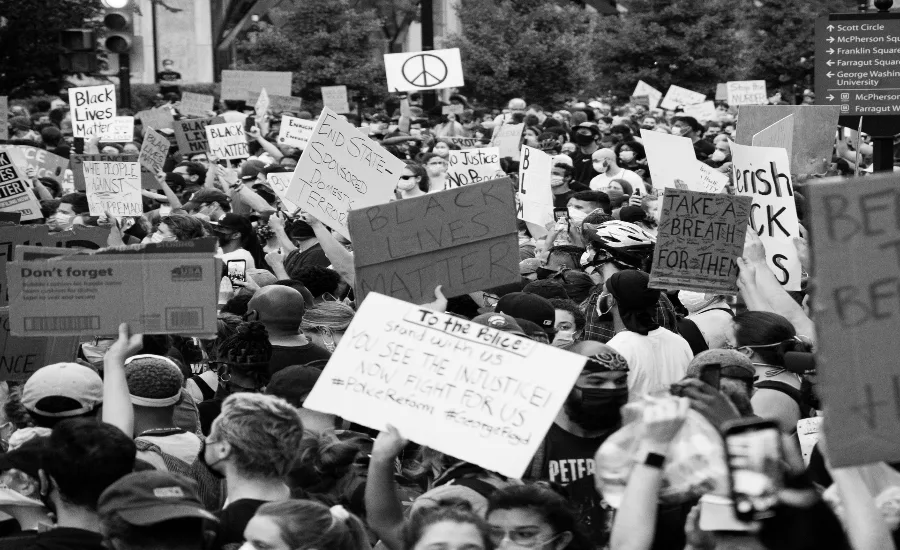Don't fall victim to scammers hiding behind a movement

The Black Lives Matter movement is spurring record-breaking fundraising online. In fact, the Minnesota Freedom Fund pulled in more than $30 million in donations alone following the death of George Floyd. The outpouring of financial support is great for these grassroots movements; however, large numbers like these often catch the eye of opportunistic scammers, unfortunately. While Black Lives Matter supporters are advocating on the street for a cause, scammers are capitalizing on their movement for their own gain.
As of today, a simple Google search for “Black Lives Matter” brought up more than 14 billion results. From social media, television and online news curators and magazines, there hasn’t been a shortage of content about the movement, providing plenty of opportunities for scammers to steal your money and identity. It’s an unfortunate reality but, with certain steps you can easily protect yourself from scheming scammers both looking to take advantage of the current Black Lives Matter movement and subsequent movements in the future.
Exploiting your generosity
Here's how most Black Lives Matter-related scams work. You receive an email with the subject line such as “vote anonymous about Black Lives Matter” or “donate to Black Lives Matter.” The body of the email asks you to click on a link or an attachment to support the movement. Once you follow the instruction, malware will be secretly downloaded to your computer, giving scammers access to your credentials and other sensitive data.
As convincing and professional as the emails may seem, you should always use caution and never click on a link, open email attachments, or provide personal information. In fact, a good rule of thumb is to never respond to unsolicited emails, text messages, or social media messages from unknown or unfamiliar senders, as they could re-direct you to a website containing malware. High-pressure tactics like time-sensitive requests for financial support is another red flag to watch out for as most reputable charities don’t aggressively solicit donations. I always recommend signing up for Scam Alerts from the FTC to keep up to date on the latest scams and always try to verify the source of any communication directly with the organization that contacted you.
Don’t overshare
With the number of hacks and data breaches increasingly annually, it’s important for you to consider what personal information you share online and where you share it publicly. A security flaw in Facebook left almost 50 million users exposed to attackers in 2018, and earlier in 2019, a massive database containing contact information (such as email addresses and phone numbers) of millions of Instagram influencers was found online. With all the data leaked in cyberattacks, hackers can piece together a holistic picture of an individual’s identity by combining stolen information with details that are publicly shared online such as birthdays, addresses, employer names and locations, among other pieces of personal info.
Scammers may lure you in on Facebook or Twitter with a direct message that plays on your emotions and asks you to donate to causes such as Black Lives Matter by clicking on a link or particular post. The link or the post then takes you to a website that requests personal data or infects your device with malware, which sends out messages from your profile to your entire contact list. Scammers like to leverage people’s trust in others as most are more likely to click a “suspicious” link from a friend – further spreading the malware with each subsequent victim.
Research before you donate
Keep in mind that scammers have weaponized movements like Black Lives Matter to exploit your goodwill and money, so it is best to wait and donate after you’ve thoroughly researched the organization to support. If you plan to make donations to a charity supporting Black Lives Matter, you should use helpful tools like Guidestar or Charity Navigator to verify the legitimacy of the charity before making a donation. Odds are if you can’t find a legitimate record of the charity and see other red flags in their communications, it’s probably a scammer looking to take advantage of your goodwill.
Also, never send cash donations, as there is always the potential for physical theft or loss in the mail. If you choose to send a check, verify the best address to send a check to ensure that it makes it into the right hands.
Be proactive
Scammers today will use any situation to their advantage in order to steal consumers’ personally identifiable information – including natural disasters, world-wide pandemics and national movements such as Black Lives Matter. That’s why it’s more important than ever for consumers to stay vigilant, practice good cybersecurity and identity protection habits, and proactively protect themselves with a comprehensive identity protection program that they can trust.
Looking for a reprint of this article?
From high-res PDFs to custom plaques, order your copy today!






.webp?height=200&t=1741190188&width=200)


